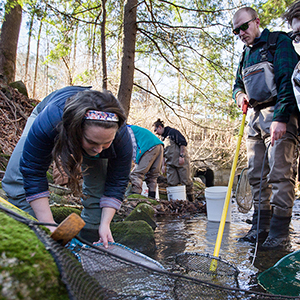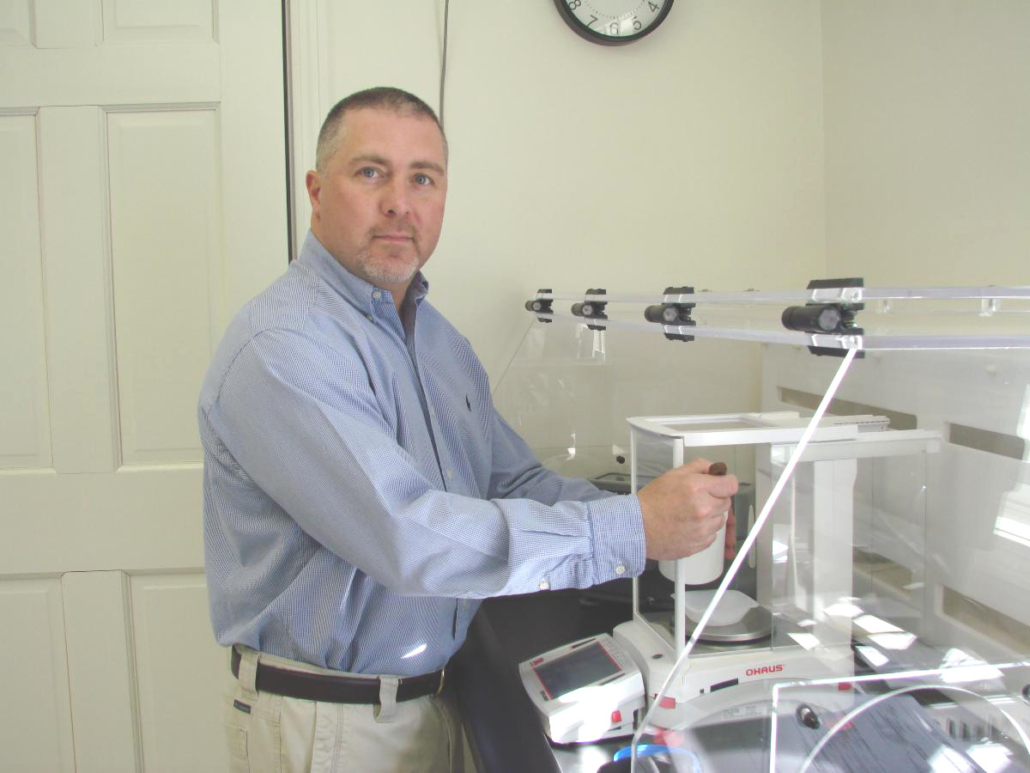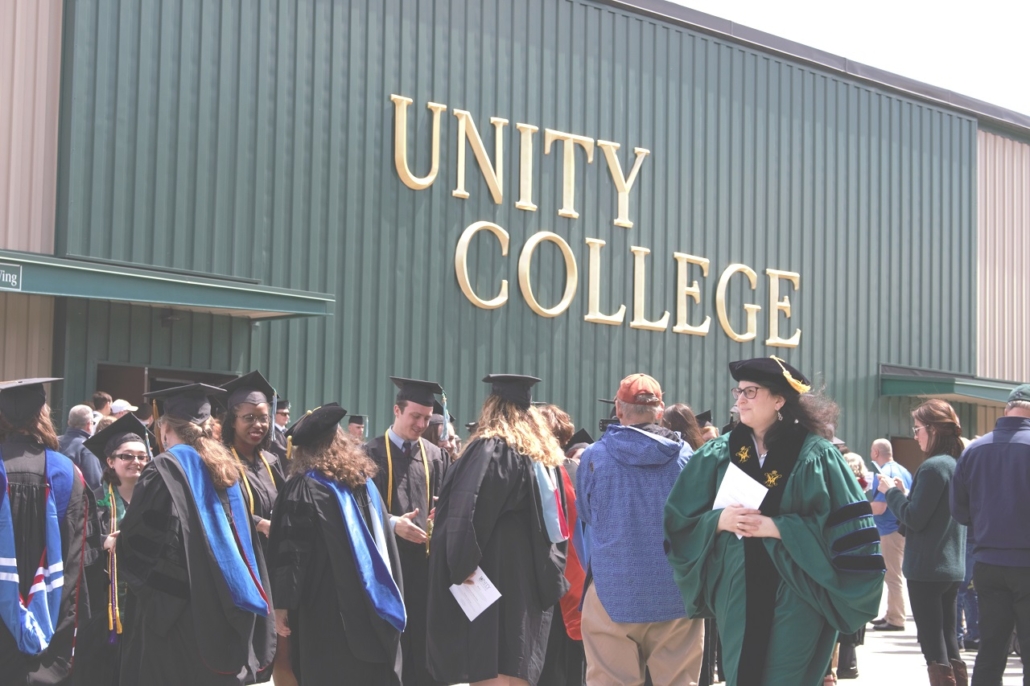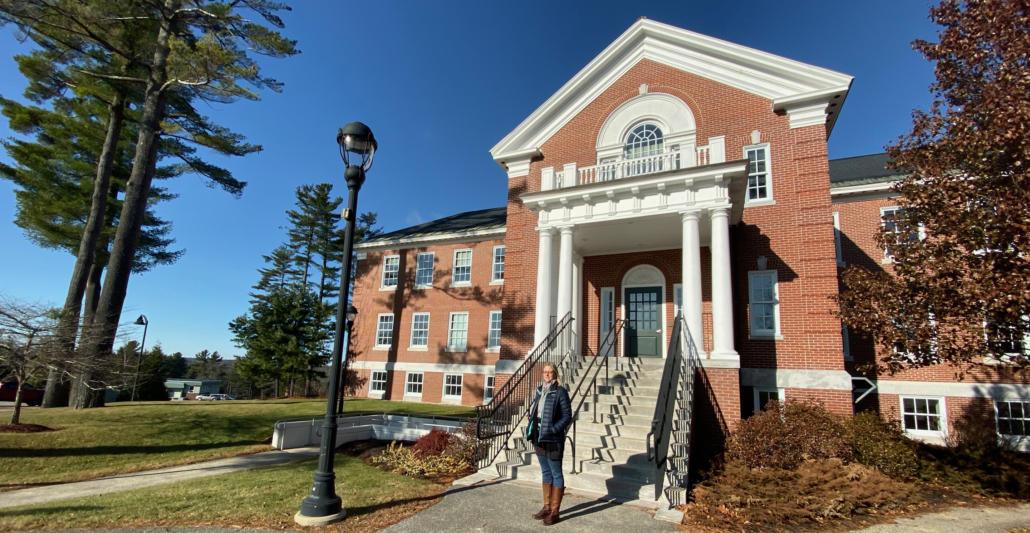
With hybrid learning, students can choose when and where to live and learn. (photos courtesy of Unity College)
by Joel Crabtree
In the fight against COVID-19, many college students across America were forced to pivot away from the traditional, four-year residential model to remote learning for the remainder of the spring semester. For most students, this was a disruption not only in their education, but in their extracurricular and social lives, leaving them with more questions than answers.
What if the delivery model for a college education wasn’t so rigid, and had built-in pathways so that students could transition from face-to-face learning to well-designed online, remote, or hybrid learning immediately without losing a step in their education?
 Unity College believes a college education should be all these things. Unity College: Hybrid Learning takes a major stride in supporting flexibility, affordability and accessibility for students while providing everything our students have come to expect from a Unity College education, and students can enroll in fall 2020 or any one of eight entry terms.
Unity College believes a college education should be all these things. Unity College: Hybrid Learning takes a major stride in supporting flexibility, affordability and accessibility for students while providing everything our students have come to expect from a Unity College education, and students can enroll in fall 2020 or any one of eight entry terms.
As he watched higher education evolve — it became clear to Unity College President Dr. Melik Peter Khoury that even more learners are now seeking a curriculum with that built-in flexibility.
This demand is heightened by unexpected events such as COVID-19, but it is also triggered by any number of economic or life changes that students may face. Because Unity College already invested in the infrastructure for quality online education five years ago and adopted nonstandard terms when Distance Education was launched, the systems are in place to offer Hybrid Learning.
“I’ve heard a lot of peers within our industry talk about returning to normal come this fall or next spring, but COVID-19 has made many of us question what ‘normal’ will look like when the dust settles, and those questioning the future include faculty, staff, and most certainly students,” said President Khoury. “While many students remain interested in the College’s traditional four-year residential programs or its exclusively online curriculum, the pandemic has inspired many students to look for a more fluid college experience, one that combines multiple modalities, schedules, and pedagogies.”
Hybrid Learning will give students the option to complete their degree through a mix of online, remote, onsite, and on-campus courses. With Unity College: Hybrid Learning, there is no set entry term, meaning students can apply year-round with eight entry terms and have the flexibility to accelerate or stop-out each term as their needs change.
Hybrid Learning will become the College’s fourth Sustainable Education Business Unit (SEBU), joining Flagship, Distance Education, and Sustainable Ventures. In this new SEBU, students can follow a curriculum that closely resembles a traditional four-year model if they so choose, or they can create their own path through eight five-week terms, with tuition differentiated based on the modality — $550 per credit hour for face-to-face courses, and $470 per credit hour for online courses. Students who take one three-credit course per term are considered full-time and are eligible for financial aid. With this flexible structure, housing and dining plan options will likewise be modular, tailored to the student’s needs.
“The first thing we look at when developing a SEBU is the audience, seeing who could benefit from this service, and how that audience differs from the other SEBUs,” added Dr. Khoury. “Each SEBU has a distinct focus and serves a different role within Unity College’s Enterprise Education model, working synergistically to fulfill the mission of Unity College. Unity College: Hybrid Learning is designed to be resilient to ever-changing internal and external uncertainties.”
Hybrid Learning will initially contain two distinct units: The School for Conservation Professions and the School of Liberal Arts and Sciences. For fall of 2020, the Hybrid Learning majors will include Conservation Law Enforcement, Captive Wildlife Care, Wildlife and Fisheries Biology, Environmental Science, and Environmental Studies. More programs are being developed and will be launched over the summer.
“With Unity College: Hybrid Learning, we’re going to emphasize skills and abilities that will really prepare students for their chosen careers, which makes these degree programs ideal for our launch,” added Dr. Erika Latty, Unity College’s Chief Learning Officer. “While Unity College: Hybrid Learning is its own distinct model for learning, students who enter into it can expect the same high quality education that our Flagship and Distance Education students experience, delivered by subject matter experts who are leaders in their fields.”
“One of the things that we always have to ask ourselves with every decision in higher education is the question of ‘what do students need?'” said Dr. Khoury. “We’re going to see a lot of schools offering unfunded scholarships, known industry-wide as discount rates, which have destabilized many schools. What we have done with Unity College: Hybrid Learning, is offer students an accredited, quality, private, non-profit education with true, published tuition rates. We’re going to forego the gimmicks that have mortgaged the future of higher education for decades, and instead blaze new trails, work hard on making it affordable, accessible, and flexible which has been a focus of Unity College since our inception. It’s exciting, but most importantly, it is going to help set a lot of students on the right course for their future.”
For more information on Unity College: Hybrid Learning, or to apply, visit unity.edu/hybrid-learning.
Joel Crabtree is Associate Director of Media Relations, Unity College – America’s Environmental College.
 The Unity Volunteer Fire Department will be hosting a bake sale on Saturday, April 3, from 10 a.m. – 1 p.m. at Cone’z on Depot Street, in Unity. This fundraiser will feature homemade pies, cakes, cookies, bars, breads, rolls and dog biscuits. Stop by and pick out your Easter treats.
The Unity Volunteer Fire Department will be hosting a bake sale on Saturday, April 3, from 10 a.m. – 1 p.m. at Cone’z on Depot Street, in Unity. This fundraiser will feature homemade pies, cakes, cookies, bars, breads, rolls and dog biscuits. Stop by and pick out your Easter treats.


 Association for the Advancement for Sustainability in Higher Education recognizes America’s Environmental College in its Sustainable Campus Index
Association for the Advancement for Sustainability in Higher Education recognizes America’s Environmental College in its Sustainable Campus Index “We here at Unity College take pride in developing the next generation of environmental leaders, and being recognized by AASHE reassures us that not only is our mission more relevant than ever, but that our curriculum and our students are thriving,” said Unity College President Dr. Melik Peter Khoury. “Through Hybrid Learning and Distance Education, we’ve taken strides to reach more students where they are, so now they can put our sustainability-minded education right to use in their own hometown. So it’s not only a win for our students, but for their communities as well. And a win for the environment, as it reduces the carbon emissions that students generate to receive a Unity College education!”
“We here at Unity College take pride in developing the next generation of environmental leaders, and being recognized by AASHE reassures us that not only is our mission more relevant than ever, but that our curriculum and our students are thriving,” said Unity College President Dr. Melik Peter Khoury. “Through Hybrid Learning and Distance Education, we’ve taken strides to reach more students where they are, so now they can put our sustainability-minded education right to use in their own hometown. So it’s not only a win for our students, but for their communities as well. And a win for the environment, as it reduces the carbon emissions that students generate to receive a Unity College education!”

 Unity College believes a college education should be all these things. Unity College: Hybrid Learning takes a major stride in supporting flexibility, affordability and accessibility for students while providing everything our students have come to expect from a Unity College education, and students can enroll in fall 2020 or any one of eight entry terms.
Unity College believes a college education should be all these things. Unity College: Hybrid Learning takes a major stride in supporting flexibility, affordability and accessibility for students while providing everything our students have come to expect from a Unity College education, and students can enroll in fall 2020 or any one of eight entry terms.

 Online undergraduate programs offer students job-ready skills in growing markets
Online undergraduate programs offer students job-ready skills in growing markets


